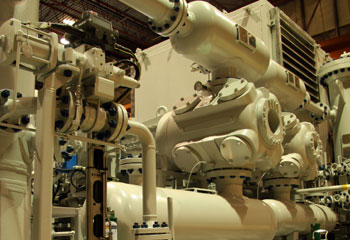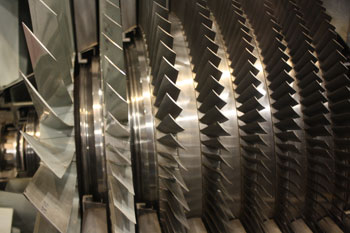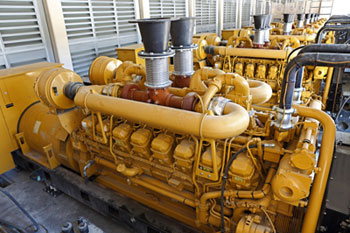FUEL AND OIL ANALISYS PACKAGES TEST

DRIVE GEAR
In this group we find: gearboxes, differentials, final drives and planetary gears which must be closely monitored for dirt and contamination by water and the most worrisome: wear the direct reading of ferrography provides a relationship of big and small ferrous particles and gives a quantitative value to indicate qualitative ferrous wear. The analytical ferrography is a qualitative and not quantitative analysis of ferrous wear with digital images of real particles very useful to analyze tendencies.
TEST PACKAGE FOR DRIVE GEARS
TRIBO I
- Analysis of elemental metals (24 by ICP)
- Crepitus water or FTIR
- Viscosity at 40°C or 100°C
- Oxidation/Nitration
- Number of acidity
- Counting of particle

COMPRESSORS
Compressors are expensive to substitute and frequently are very important for production.The spare parts are difficult to obtain and a waste of valuable time and money for inactivity periods not programmed. By adding the counting of particles in the basic package of routine tests for preventive maintenance, failures of a component can be predicted y provide a programmed control of production.
TEST PACKAGE FOR COMPRESSORS
TRIBO II
- Analysis of elemental metals (24 by ICP)
- Water by Karl Fischer
- Viscosity at 40° or 100°C
- Oxidation/nitration
- Number of acidity
- Counting of particles

TURBINES
The reliability of turbines is always critic and failures or oil changes are expensive.
They have extreme functioning tolerances which demands clean fuels. A routine analysis of tendencies is crucial for preventive maintenance of the turbine. Combining both the direct and analytical ferrography with monthly routine, the type of wear can be indentify as well as the sources of can contamination. The essay of potential varnish in turbines is focused at 2 levels and it is useful in the antioxidant depletion trend in a fluid by measuring of the quality control of the oil of the turbine in use and also the measuring of the oil properties and the tendency of its degradation level.
TEST PACKAGES FOR TURBINES
TRIBO II
- Analysis of elemental metals (24 by ICP)
- Water by Karl Fischer
- Viscosity at 40° or 100°C
- Oxidation/nitration
- Number of acidity
- Counting of particles
TRIBO III
- Linear sweep voltammetry
- MCP (Patch membrane colorimetric) condition of the Varnish.
- Analysis of elemental metals (24 by ICP)
- Viscosity at 40°
- Number of acidity
- Oxidation/nitration
- Water by Karl Fischer
- Analytical ferrography
- RPVOT
- Separability of water
- Rust
- Foam

HYDRAULIC SYSTEMS
These systems work with very narrow tolerances so they demand a regular cleaning control of fluids.
The counting of particles can detect with sufficient time the potential damage caused by dirt and contaminants to take preventive measures.
Water is the most worrisome because increases the acidity, oxidation and reduces the lubricating layer and induces a failure in the system.
The water essay by Karl Fischer, provides an accurate measurement of the amount of water present in fluids for hydraulic applications which are critic in small quantities. A complete analysis is offered as follows.
TEST PACKAGE FOR HYDRAULIC SYSTEMS
TRIBO I
- Analysis of elemental metals (24 by ICP)
- Water by Karl Fischer
- Viscosity at 40° or 100°C
- Oxidation/nitration
- Number of acidity
- Counting of particles

MOTORS
The analysis of oil can identify 4 main causes of motor mortality before it is too late. The routine tests can indicate the origin of problems and consequences for the equipment. The fuel dilution is the amount of crude fuel not burned in the carter. This reduces the viscosity and creates wear by friction almost immediately. Levels of dilution greater than 8% could cause the explosion of the carter.
Soot is a sign of reduction of efficiency of combustion and cause by overfeeding of fuel, limitation of air, blow-bg, excessive use of motors brake and/or excessive engine exhaust backpressure. The normal coolant enters the engine through a broken seal or joint, cracked cylinder head, defective water pump or coolant and can cause wear of bearing, bushings, pistons, liners, camshafts and valves. Dirt is detected by the presence of silicon and aluminum which provokes a fester wear of component made with iron, copper and tin like pistons, bushing and liners.
In Diesel and natural gas engines, oil must be routinely tested to monitor contamination and wear. It is important to preserve the alkalinity reserve. The test package must include a number of total basics. Thanks to its susceptibility to corrosion of oil for natural gas engines, a number of essays for total acidity and oxidation/nitration must be done.
TEST PACKAGE FOR NATURAL GAS ENGINES
TRIBO V
- Analysis of elemental metals (24 by ICP)
- Viscosity at 100°C
- Number of acidity
- Oxidation/Nitration
TEST PACKAGE FOR DIESEL ENGINES
TRIBO IV
- Analysis of elemental metals (24 by ICP)
- Viscosity at 100°C
- % of dilution of fuel
- % of soot
- Oxidation/Nitration
- Number of basicity

